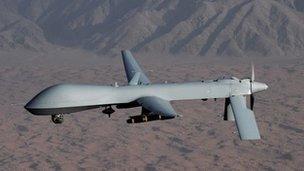US drone strikes: Memo reveals case for killing Americans
- Published

The legal basis for using drone strikes to kill US citizens has been disclosed in a leaked justice department memo.
US officials can authorise the killing of Americans abroad if they are leaders of al-Qaeda or its allies, according to the document obtained by NBC News.
Lethal force is lawful if they are judged to pose an "imminent threat" and their capture is not feasible, it adds.
US drone strikes against militant suspects in countries such as Yemen and Pakistan are deeply controversial.
Under President Barack Obama the US has expanded its use of drones to kill hundreds of al-Qaeda suspects, arguing that it is acting in self-defence in accordance with international law.
Critics argue the drone strikes amount to execution without trial and cause many civilian casualties.
Legal framework
The undated 16-page Department of Justice white paper published by NBC gives more details of the justification for the use of drones outside recognised war zones.
BBC's Orla Guerin: "The study says that drones are damaging and counterproductive to US security interests"
It says sovereignty is not deemed to have been violated if the host nation gives its consent, or is unwilling or unable to suppress the threat posed by the individual targeted.
It also sets out a "legal framework" for the use of lethal force against US citizens in foreign countries.
It concludes that such killings do not violate the US Constitution as long as:
- An informed, high-level official of the US government has determined that the targeted individual poses an imminent threat of violent attack against the US
- Capture is infeasible and the US continues to monitor whether capture becomes feasible
- The operation would be conducted in a manner consistent with applicable law of war principles
The paper adopts a broad definition of "imminent threat", saying it is not necessary to produce evidence that a specific attack is being planned if the target is generally engaged in plotting against the US.
'Remarkable document'
It also asserts that courts should not play a role in reviewing or controlling such decisions.
The American Civil Liberties Union (ACLU) said the white paper was a "pretty remarkable document".
Jameel Jaffer, deputy legal director of the ACLU, said in a blog post the paper revealed "both the recklessness of the government's central claim and the deficiencies in the government's defense" of its drone strike policy.
"This sweeping authority is said to exist even if the threat presented isn't imminent in any ordinary sense of that word, even if the target has never been charged with a crime or informed of the allegations against him, and even if the target is not located anywhere near an actual battlefield," Mr Jaffer added.
The ACLU has helped the relatives of three Americans who died in drone strikes sue the Pentagon and CIA. Their lawsuit claims the deaths were unconstitutional.
Anwar al-Awlaki, an al-Qaeda suspect born in the US state of New Mexico, was killed by an unmanned plane in September 2011.
Samir Khan, a naturalised US citizen who produced an online magazine promoting al-Qaeda's ideology, died in the same missile strike.
Awlaki's 16-year-old son, Abdulrahman, who was born in Colorado, was killed a month later.
The Obama administration has been under growing pressure from politicians in Congress to share more details of its drone strike programme, including secret legal documents.
Last month the UN launched an inquiry into the impact of drone strikes on civilians.
- Published24 January 2013
- Published19 July 2012
- Published31 January 2012